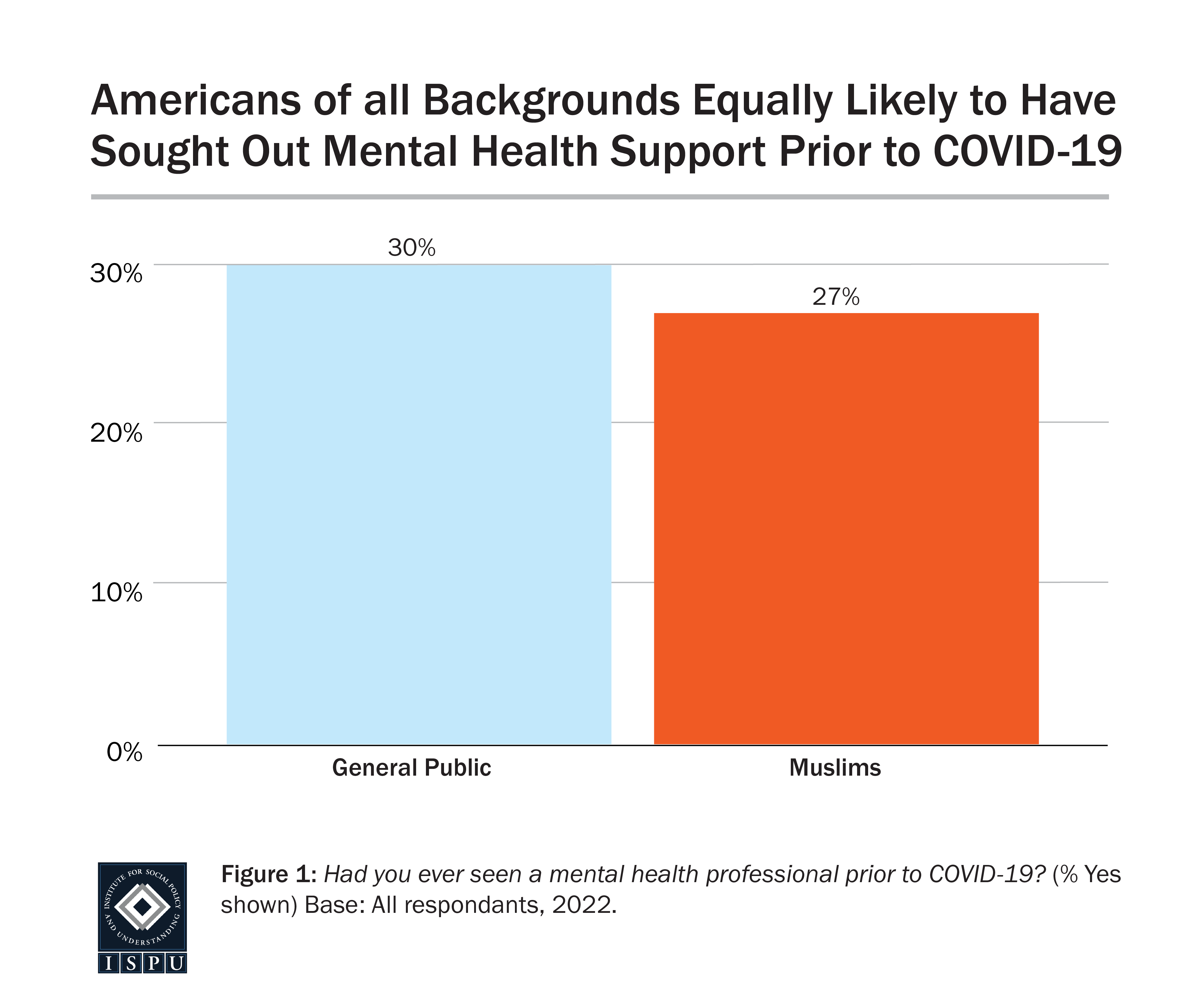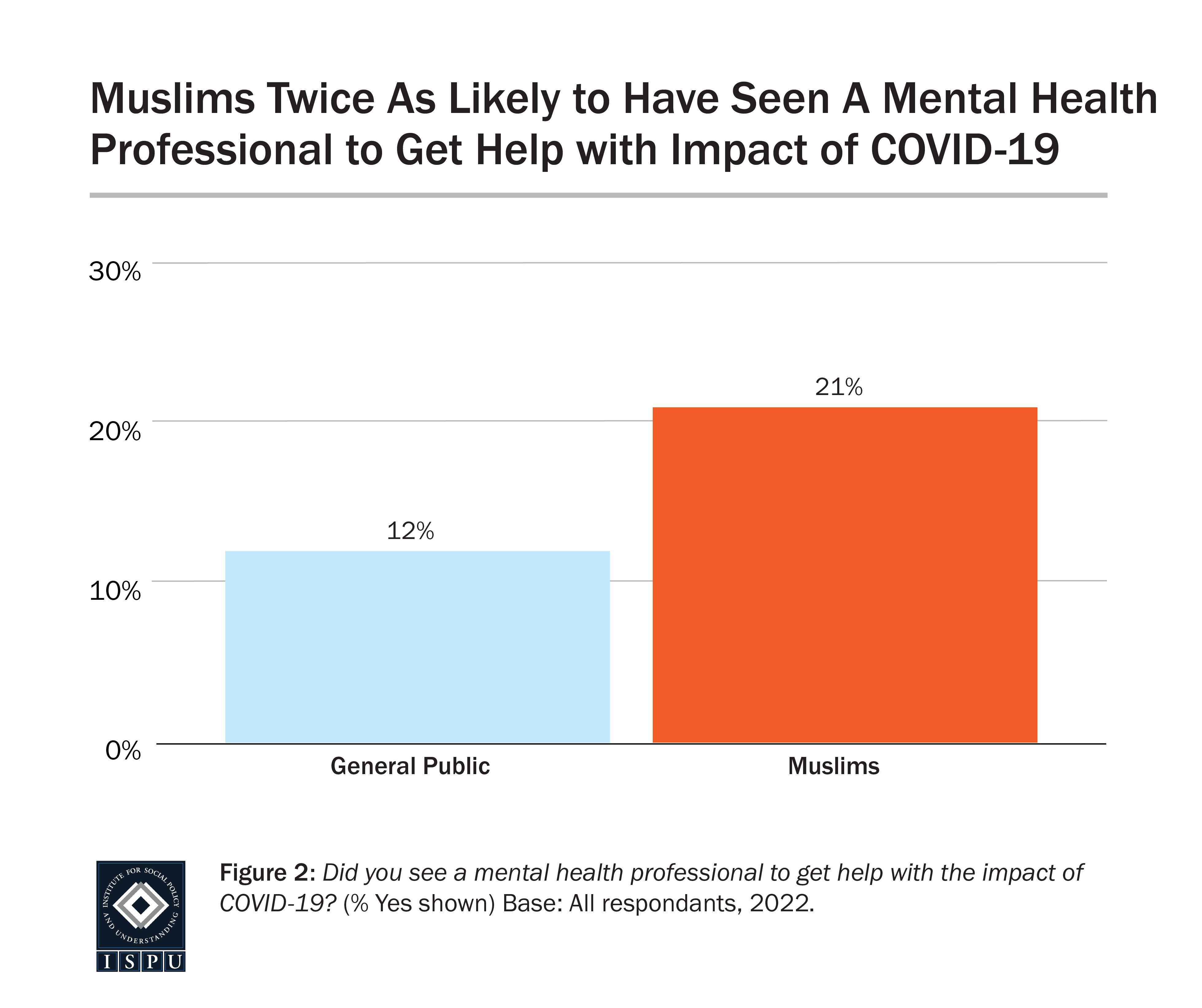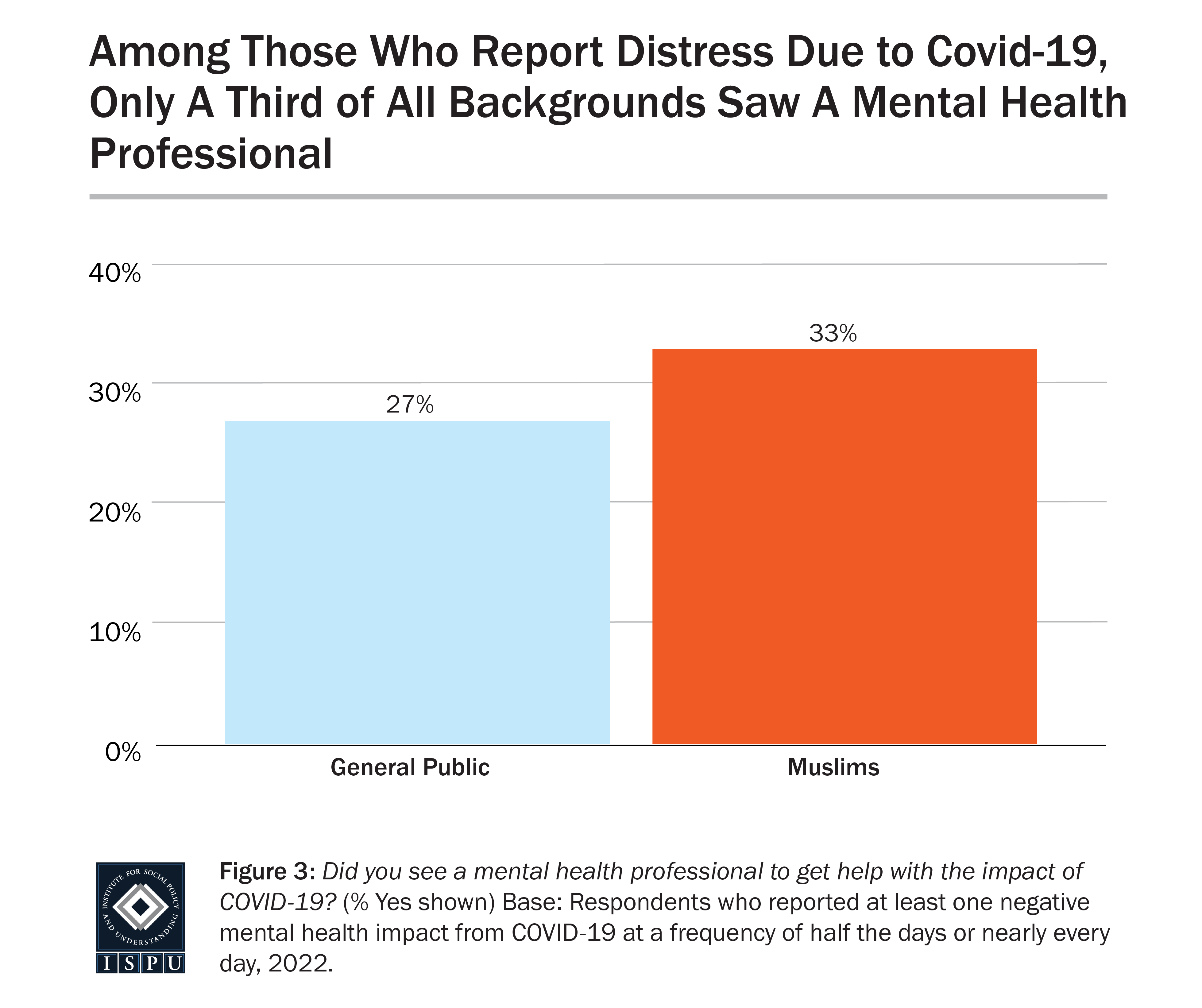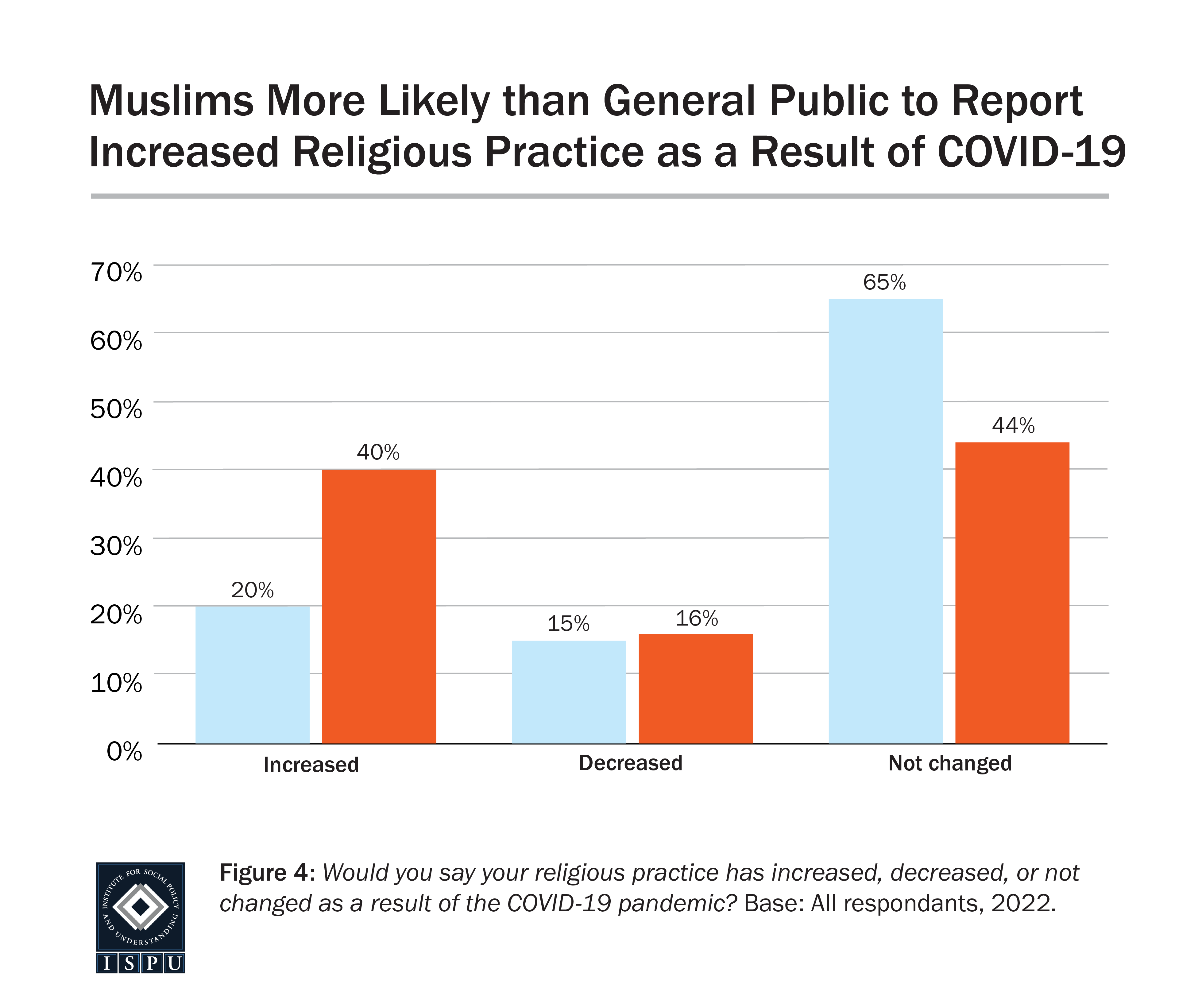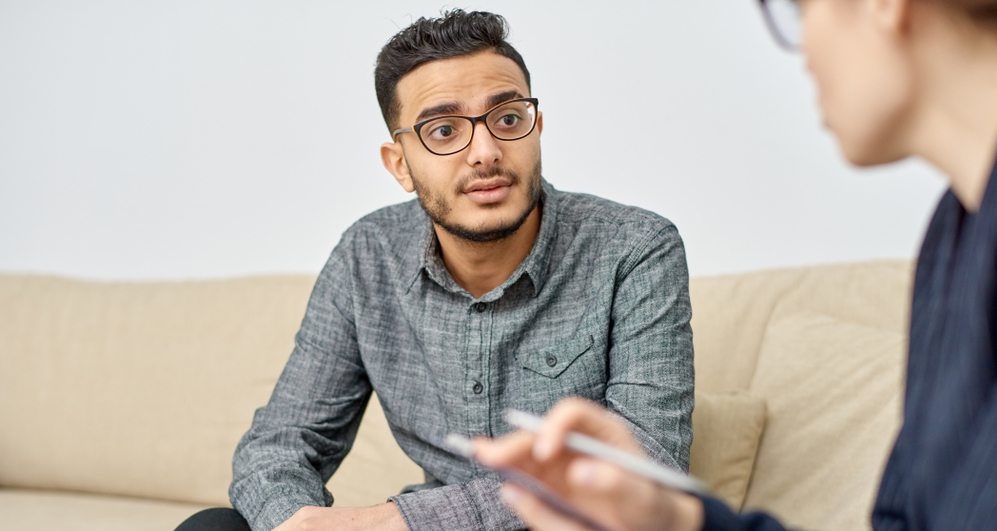
Only A Third of Americans In Distress Seek Out Mental Health Support
Muslims are more likely than the general public to rely on faith and family to cope
May 16, 2022 | BY DALIA MOGAHED
SUMMARY
Muslims experiencing distress report accessing mental health professionals at equal rates as their counterparts in the general public with the same mental health challenges, but they are more likely to tap into their faith to cope with the negative mental health impacts of COVID-19.
As reported previously, Muslims are slightly more likely to report experiencing negative psychological consequences in response to COVID-19 than their counterparts in the general population. These consequences include anger, depression, anxiety, and difficulty sleeping.
This is not surprising considering that Muslims have also faced more challenges as a result of COVID than their counterparts in the general population, also previously reported. This includes greater job loss, pay cuts, and more frequent experience with covid hospitalization and even death.
This article uses data from a survey fielded by ISPU from March 22, 2021 through April 8, 2021 to assess American Muslims’ experiences living for one year through the COVID-19 pandemic; we’re exploring how Muslims respond to the mental health challenges they face as a result of COVID, who they turn to, and how they cope. The survey also provided comparisons to the general population. The full survey methodology is available here. We end with a number of recommendations and areas for further research. For additional resources on coping with the mental health challenges of COVID-19, see below for a list of resources.

Only A Third of Americans In Distress Seek Out Mental Health Support
Muslims are more likely than the general public to rely on faith and family to cope
May 16, 2022 | BY DALIA MOGAHED
SUMMARY
Muslims experiencing distress report accessing mental health professionals at equal rates as their counterparts in the general public with the same mental health challenges, but they are more likely to tap into their faith to cope with the negative mental health impacts of COVID-19.
As reported previously, Muslims are slightly more likely to report experiencing negative psychological consequences in response to COVID-19 than their counterparts in the general population. These consequences include anger, depression, anxiety, and difficulty sleeping.
This is not surprising considering that Muslims have also faced more challenges as a result of COVID than their counterparts in the general population, also previously reported. This includes greater job loss, pay cuts, and more frequent experience with covid hospitalization and even death.
This article uses data from a survey fielded by ISPU from March 22, 2021 through April 8, 2021 to assess American Muslims’ experiences living for one year through the COVID-19 pandemic; we’re exploring how Muslims respond to the mental health challenges they face as a result of COVID, who they turn to, and how they cope. The survey also provided comparisons to the general population. The full survey methodology is available here. We end with a number of recommendations and areas for further research. For additional resources on coping with the mental health challenges of COVID-19, see below for a list of resources.
Muslims report accessing mental health professionals as often as the general public
Just over a quarter of Muslims (27%) report having ever seen a mental health professional prior to COVID-19. This is no different than the general public (30%) who say the same. This suggests that, going into the pandemic, seeking mental health support was no more stigmatized among Muslims than it was among the general public.
What is perhaps more surprising is that our research found that, one year into the pandemic, Muslims are roughly twice as likely (21%) as the general public (12%) to report having sought out the support of a mental health professional to get help with the impact of COVID-19. At the same time, Muslims were more likely to report experiencing a negative mental health consequence to COVID-19 “so much that it interferes with their daily function.” Since a larger share of Muslims reported distress, it is therefore to be expected that a larger share sought out help.
To understand if seeking out mental health professionals is more of a practice among Muslims vs. the general public, we need to compare the behavior of those who experienced distress in each group. Among Muslim respondents who reported at least one negative mental health impact from COVID-19 at a frequency of half the days or nearly every day, 33% sought out a mental health professional, on par with 27% among the general public who reported the same adverse mental health impact. This means only a third of those who experience distress, even when it interferes with their daily functioning, seek out help. It also means Muslims fare no worse and no better than the general public in this regard. Why are so many not seeking out help when they need it? Further research is needed to answer this question, but answers may include an inability to afford mental health support, a lack of trust in practitioners, or inability to access culturally competent help.
Muslims More Likely than General Public to Rely on Faith and Family to Cope with COVID-19
Where Muslims (whether they experienced distress or not) do stand apart is not in their reluctance to make use of a mental health professional, but rather in how they rely on their faith and social bonds to cope with the distress caused by COVID.
The Role of Faith and Family
American Muslims are almost twice as likely as the public at large to say religion is an important part of their daily life, where two thirds (67%) say their religion is either “very” or “extremely” important, compared to 35% of the general public. The prominence of faith shows up in the ways they report coping with the stress of the pandemic. Muslims are more likely to say their religious practice has increased (40%) rather than decreased (16%) as a result of the pandemic and are twice as likely as the general public to report increased religious devotion (40% vs. 20%).
Muslims were also more likely to rely on prayer and engaging with their scripture to cope with the pandemic as compared to the general public. When asked “Regardless of how much stress you are experiencing, please indicate to what extent you have used the following to cope with the COVID-19 pandemic in the past month?” Muslims were more likely than the general public to report doing extra prayer (31% vs. 19%), and were twice as likely as the general public to read or listen to their holy book (30% vs. 14%).
Muslims were also more likely than the general public to reach out to”their friends and family for comfort” (45% vs. 38%). Remarkably, Americans who are Muslim were also more likely to report their personal and professional relationships had improved since the onset of the pandemic.
Making Sense of the Results
This research suggests that seeking mental health support from a professional is no more stigmatized in the American Muslim community than it is in the general public, but that only roughly a third of people of any background seek out when in distress. The interventions to encourage more people to seek out help should take this into account, and should not assume Muslims are exceptional in their stigmatization of therapy. Further research is needed to better understand why more people don’t seek out therapy when they have mental health challenges so severe that it interferes with their daily function. One possible obstacle may be affordability, since many have been hard hit economically by the pandemic. Another possibility is a dearth of culturally competent practitioners.
These results also point to the powerful role of faith and healthy families in helping individuals cope with difficult circumstances. ISPU provides resources for building engaging Muslims spaces and promoting healthy families.
Additional Resources:
-
- Wellbeing in the Time of Coronavirus – An FYI Toolkit
- U.S. Department of Health & Human Services Mental Health and Coping during the Coronavirus (COVID-19) Pandemic
- National Institute of Mental Health Shareable Resources on Coping with COVID-19
- Building Engaging Muslim Spaces
- Promoting Healthy Marriages

Dalia Mogahed is the Director of Research at the Institute for Social Policy and Understanding, where she leads the organization’s pioneering research and thought leadership programs on American Muslims. Learn more about Dalia→


